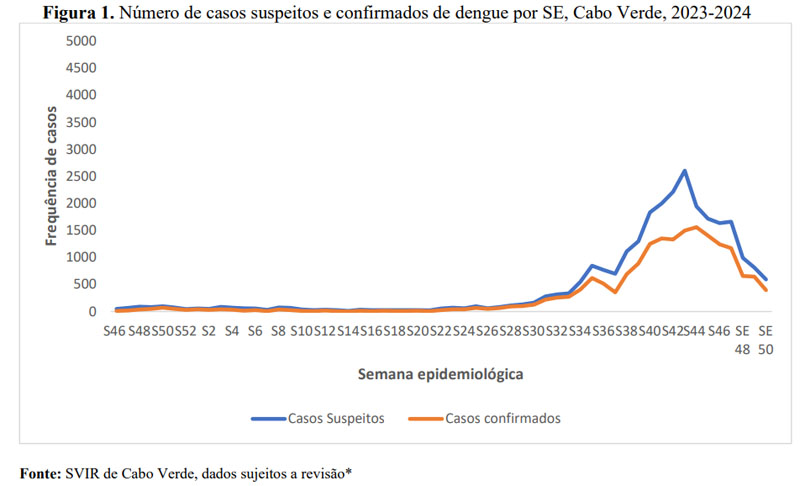by Dr. Pitt Reitmaier - tropical hygiene and public health
2009: Dengue-outbreak on the southern island of the Cape Verde Archipelago
For the first time in history, starting in
September 2009, an epdemic of a hemorrhagic fever spread
on the
leeward (southern) group of islands, Santiago, Maio, Fogo and Brava. On 22 Oct 2009
Dengue-virus Serotyp-3 was identified (Institut Pasteur - Dakar - Senegal). In total 20914 cases were registered by the health services, 174 developed the severe, hemorrhagic form of the disease and 6 patients came to death. (latest in 04.11.2009).
Dengue is an arbovirus, means it is transmitted by arthropods, the mosquito Stegomyia (formerly aedes) wich also transmits Chikungunya, Yellow Fever, West-Nile-Fever, Zika-Virua and otheres. This mosquito does breed in very small sweet-water pockets like flour pots, tins, bottles, plastic bottles, empty tetrapacks and tyres and it can even breed in polluted water. This makes it a civilization-follower, hard to contol in poor urban environment, where garbage collection continues insufficient. Climate change and mass-tourism help to spread it to moderate climate zones where mosquitoes have started their adaptation to cooler temperatures. .
Geographic center of the epidemic
was the countries capital, City of Praia on Santiago island with the highest number of cases, nevertheless, the smaller city of São Filipe auf Fogo showed even higher incidence rates (new cases per 1000 inhab.) The southern islands Santiago, Fogo und Maio were the strongholds of lokal transmission, while Brava on the northern islands Sal, Boa Vista und São Nicolau very few important and authochonous cases were reported and the islands of São Vicente and Santo Antão remained free of authochonous transmission.
Summer 2024: Outbreak on the southern islands (Sotavento).
The rainy season started relatively late this summer but brought good rains with little destruction. Until the end of September 2024 nearly 5000 confirmed casa of dengue were registered. The geographic distrubtion is alike previous outbrakes of mosquitoborn infections in Cape Verde. The most affected district is the capital Praia with araund 4000 confirmed cumulated cases. The islands of Fogo, Brava and Maio also are affected, while on the islands of the northern group (Barlavento) only singular cases were registered so far. Actualy no severe cases are hospitaiized and to date 2 casas of death occured.
On 03 10 2024, the government declared a state of emergency after the total number of confirmed cases rose to over 9000. This allows for more effective cleaning campaigns in littered neighbourhoods and inhouse spaying of of insecticides in residential areas. In November, the number of new cases per day continues at the same level, e.g. on 22.11.2024: 228 out of 350 analises, seven hospitalized patients, total number of confirmed cases: 16.153 in unchanged geographic distribution, 9.784 in the Capital Praia 1.875 in São Filipe (Fogo) and 1.056 in Stª Cruz. The number of deaths has reached 8.
On 12.01.2025 27392 susprected cases ans 18531 lab-confirmed casas are registertd with an unchanged number of 8 deaths. The Epidemic seems to run out, with São Vicente lagging behind with low Incidence

Conclusion:
The Dengue-Epidemic 2023-24 of Serotyp-3 and Serotyp-1 in Cidade da Praia (Island Santiago), Fogo, Brava and Maio seems to run out soon.
(Status of Information 12.01.2025)
Recommendations:
- avoid mosquito-bites
see also:: Zika-Virus in Cape Verde
All information to the best of our knowledge and belief - No warranty !
For individual recommendation, please contact your physician!